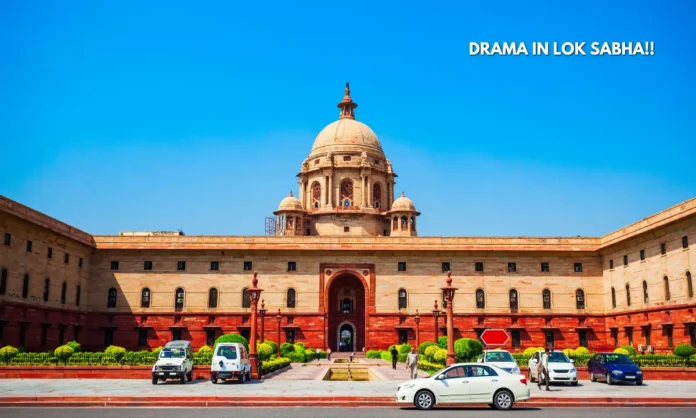Summary
- Shashi Tharoor’s rare endorsement of BJP sparks curiosity.
- Akhilesh Yadav asserts strength, challenging Amit Shah on Pakistan.
- Priyanka Gandhi counters Shah’s narrative with a personal touch.
What Happened In Lok Sabha?
In the high-stakes theatre of India’s Lok Sabha, the recent session during Amit Shah’s address on Operation Sindoor revealed more than just political speeches. From unexpected gestures to charged confrontations, Parliament became the stage where politics were not just debated, but performed. Shashi Tharoor’s rare endorsement of BJP’s narrative on Pakistan, Akhilesh Yadav’s assertive entry, and Priyanka Gandhi’s calm yet sharp retorts all added to the drama. These moves were more than mere political statements; they were signals of shifting alliances, mounting tensions, and political posturing.
With every gesture, these figures sent powerful messages, subtly shaping the national debate on issues of national security and territorial integrity. This article explores these moments, delving into the deeper stories behind the moves, silences, and interventions that unfolded in the Operation Sindoor debate in the Lok Sabha.
22 मिनट की जवाबी कार्रवाई…32 घंटे की सियासी तकरार – संसद में Operation Sindoor पर 🔥 घमासान!
— Sanjeev (@wing4destiny) July 27, 2025
⚖️ सरकार – ‘घर में घुसे,मारा और निकले’
❓ विपक्ष – पूछ रहा है ‘कब,कैसे और क्यों?’
क्या @rajnathsingh सैनिकों की शौर्यगाथा पर सियासत हावी होने देंगे? 🛡️#loksabha #RajyaSabha #Politic pic.twitter.com/CDNLXUMGm5
Operation Sindoor – The National Security Debate
Operation Sindoor has sparked a series of political responses, with Home Minister Amit Shah leading the charge in defending the government’s stance on Pakistan and national security. The core of his address revolved around India’s firm stand on Pakistan-occupied Kashmir (PoK) and the government’s decisive actions in response to terror attacks. His speech, however, was not just a national security briefing but a politically charged moment, setting the stage for a complex exchange in Parliament regarding Operation Sindoor.
The opposition’s sharp reactions were not merely to question government policy but to challenge the broader narrative surrounding India’s handling of the Kashmir issue. The use of Pakistan as a central figure in Shah’s speech invited rebuttals, with Akhilesh Yadav, in particular, stepping up to question the government’s approach during the Operation Sindoor debate.
Behind the Gestures
While the speeches were dramatic, it was the subtle gestures and reactions that conveyed deeper insights into political dynamics during Operation Sindoor. Shashi Tharoor’s desk-thumping in approval was an unexpected moment of solidarity from a Congress MP. This rare endorsement of BJP’s hardline stance was a significant departure from Tharoor’s usual positions and underscored a complicated dynamic within Congress. His actions raised questions about internal party debates and the alignment of political figures across party lines in the context of Operation Sindoor.
Akhilesh Yadav’s deliberate entry into the session, followed by his challenge to Amit Shah, marked his increasing confidence in asserting his political space. By questioning Shah’s rhetoric on Pakistan, Yadav positioned himself as a key opposition leader willing to confront the BJP head-on in the Operation Sindoor debate.
Political Postures Beyond Policy
While the rhetoric and policies around national security dominate public discourse, the subtle political postures during this session suggest a larger conversation on power dynamics, party loyalties, and shifting alliances, particularly in the context of Operation Sindoor. Union Minister Gajendra Singh Shekhawat’s respectful gesture of vacating his seat for Finance Minister Nirmala Sitharaman is a prime example of the unspoken signals that resonate in the corridors of power. Similarly, Priyanka Gandhi’s composed demeanor and note-taking throughout Shah’s speech hinted at her strategic preparation to counter the BJP’s narrative, reflecting a calculated approach in an otherwise heated atmosphere. These behind-the-scenes gestures, whether subtle or overt, added layers to the public narrative of national security, with Operation Sindoor taking center stage.
The Political Theatre Continues
As the government strengthens its position on national security and territorial integrity through Operation Sindoor, the opposition’s growing assertion of power will likely continue to play out in Parliament’s chambers. The shifting political alliances within Congress and the broader opposition, coupled with moments of solidarity like Tharoor’s desk-thumping, suggest that Operation Sindoor is not just a one-off episode but a series of debates that will define the future course of national security discourse in India. With leaders like Akhilesh Yadav stepping up and Priyanka Gandhi holding her ground, the political theatre in Lok Sabha is likely to evolve, offering new narratives for both the ruling and opposition camps.
Final Verdict
In a session marked by political theatre, the real story was not just in the speeches but in the gestures and dynamics that unfolded on the floor of the Lok Sabha. From Tharoor’s unexpected endorsement to Akhilesh Yadav’s bold challenge, the Operation Sindoor debate revealed deeper layers of Indian politics. These moments, subtle yet powerful, signal a political landscape in flux, where national security issues are intertwined with party strategies, internal alignments, and personal loyalties. As the country watches, the political drama surrounding Operation Sindoor is set to continue, with every gesture speaking volumes about the future of India’s political discourse.


